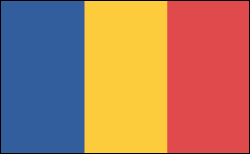Chad News & Current Events


Signs of Hope for Peace Between Chad and Sudan
Deby met with Sudanese president Omar al-Bashir in March 2010, and the two said their countries are ready to normalize relations. Though no formal agreement was reached, many observers expressed hope that peace would take hold. The leaders themselves expressed optimism. Bashir said, "Deby and I are here to confirm to the Sudanese-Chadian people that we have turned the page of our differences and disputes between the two states. From today, our common battle is the realization of peace, security and stability for the affluence of the people of the two states." And Deby requested that Chadian rebels in Sudan put down their arms and return to Chad. The border between the countries reopened in April.
Fifty Years of Independence
Jan. 2011 marked 50 years of independence from France.
Calls of fraud and misconduct in February's parliamentary election led to the opposition's boycott of Chad's presidential election in April. Vying against only two other candidates, Idriss Déby earned 88.6% of the vote and was reelected for a fourth term as president.
In July 2011, Hissène Habré, who was overthrown in a coup d'état led by Idriss Déby in 1990, had his repatriation canceled; he remained in Senegal and will not return to Chad, where he earned a sentence of death for crimes against humanity while president from 1982-1990.
Long-Planned Coup Foiled
In Jan. 2013, Prime Minister Emmanuel Nadingar resigned. Djimrangar Dadnadji was named as new prime minister. In May, a long-planned coup against the government of President Idriss Deby was foiled by Chadian security forces.
Fallout from the coup resulted in a motion of censure against Prime Minister Dadnadji in Nov. 2013. Citing "arbitrary arrests of deputies,” the censure was not executed because the prime minister resigned. President Idriss Déby Itno named Kalzeubé Pahimi Deubet as new prime minister on Nov. 21, 2013.
Chad sent troops to Nigeria in January 2015 to help fight Boko Haram, the fundamentalist Islamist sect that believes Western education is a sin. In June, suicide bombers believed to be linked to the group launched a series of attacks in the capital, N'Djamena, killing more than 20 people.
Prime Minister Kalzeubé Pahimi Deubet resigned on Feb. 13, 2016. That same day, President Déby named Albert Pahimi Padacke as Deubet's replacement. Pahimi Padacke previously served in many government positions, including Minister of Finance, Minister of Trade, Minister of Justice and Secretary of State for Finances.
See also Encyclopedia: Chad .
U.S. State Dept. Country Notes: Chad







